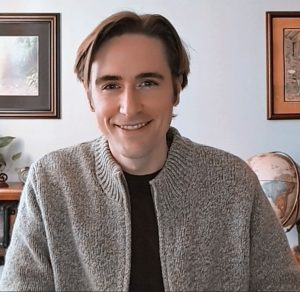Published on
Updated on

Q&A With Jonathan Cisco, Director of Educational Assessment
Jonathan Cisco returned to Mizzou in February to serve as MU’s inaugural Director of Educational Assessment, a position created to support faculty and department chairs. As the Director of Educational Assessment, Dr. Cisco develops trainings on course design, curriculum mapping, learning objectives, and assessment alignment across all of MU’s academic programs, and he is helping the faculty make strategic and data-driven improvements to their assessment processes.
Note: Some responses have been edited for style and clarity.
What made you want to apply for this new position?
My career has straddled two primary areas in higher education: faculty development and curricular development. I have a history with the University of Missouri, with my work as Assistant Director of the Campus Writing Program and later Associate Director of the Teaching for Learning Center (with a faculty role in Scotland in between). After T4LC, I worked with a startup company in educational technology as their Director of Education.
Through that position in EdTech, I worked with over 60 universities across the world on various accreditation and curriculum mapping efforts. When learning about this new position at MU, the upcoming Higher Learning Commission (HLC) accreditation, and where the University of Missouri really needed to be in terms of curriculum mapping campuswide, the position kind of spoke to all of those different areas of expertise and things that I love doing.
What has been the most rewarding aspect of this role?
I think the most rewarding has been recognizing and being reminded of Mizzou’s commitment to student learning. Whether I’m speaking with a chair of a smaller program that wants to revise or alter their program outcomes, or if I’m speaking to the Provost’s Office or, if I’m speaking to Interim Provost Matt Martens, or I’m speaking to Associate Provost Alex Socarides, I’ve gotten nothing but incredible support in wanting to demonstrate how Mizzou considers student learning a priority.
I was immersed in that culture through my work at Campus Writing Program and the work with Teaching for Learning Center. Something that keeps Mizzou very much apart from other institutions of its caliber is that it has this rich culture of teaching. Just being reminded of that and seeing it recognized in newer faculty that maybe I haven’t worked with before, or seeing it recognized in disciplines that one wouldn’t initially expect student learning to be a priority in — that’s been 100% consistent with everyone I’ve worked with thus far.
How did you end up being a lecturer in Scotland?
I was ready to be stretched professionally, and a university in Scotland was redesigning its curriculum to be competency-based and needed my help. I learned so much about curriculum, faculty development, and diplomacy in that position. This sounds like a cliche, but I learned the most from my students. They guided me through cultural blunders and were the first to show me what was working and wasn’t working in the curriculum revamp. That’s why we’re in this game in the first place, whether it’s in the U.K. or the States. All this stuff, –writing course objectives, program outcomes, mapping curricula, accreditation, assessment– comes down to improving student outcomes. That’s what matters.
What is your involvement in the Higher Learning Commission (HLC) accreditation process?
My goal has two parts. The first part is to help all academic programs articulate program outcomes and how they can measure student learning. It’s not just that we have lofty goals. But what are the things that students should be able to do in our discipline when they finish the program? How do we know if we were successful? That’s the measurement piece of program outcomes.
The second part is to help academic programs articulate how a course objective is mapped to one or more program outcomes, also called curricular mapping. Can we go to any course and see a learning activity or assessment and see how that is aligned explicitly to a course objective, and then how that course objective is aligned to a larger outcome? Alignment is vital to learning and an expectation of the 21st century student.
Here’s the deal: MU has the opportunity to not only succeed in HLC accreditation, but to flex in HLC accreditation. My goal is essentially to show off the culture that I know is here and just help guide faculty leadership to getting to that point.
What resources for course design would you emphasize for faculty to know? How should faculty reach out to you as a resource?
The three major hubs are the Teaching for Learning Center, the Campus Writing Program, and now, Educational Assessment. T4LC is deliberately set in the middle of campus with an excellent team, and the Campus Writing Program has been around since 1987 and recognized in U.S. News and World Report. We are a unified force to help faculty and student learning across campus.
In April, I will conduct workshops for chairs and faculty on Phase I (Program Outcome Assessment) and Phase II (Curriculum Mapping) process of preparing for HLC. I also work with departments individually on curriculum and assessment. I’d encourage folks to review the new Assessment of Student Learning webpages. Folks can also contact me directly at ciscojo@missouri.edu.